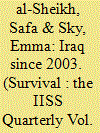| Srl | Item |
| 1 |
ID:
107154


|
|
|
|
|
| Publication |
2011.
|
| Summary/Abstract |
The US-led invasion of Iraq in 2003 had a traumatic effect on Iraqi society, causing it to break down into different armed groups that at times fought the US-led Coalition, the new government, members of other sects and even members of the same sect in a nation-wide conflict that claimed the lives of well over 100,000 Iraqis. While this violence has since decreased, Iraq's stability gains remain fragile, and the country's future is uncertain. To understand why there was so much violence in Iraq after 2003, and why the violence eventually decreased, it is important to examine the contending perspectives of the different groups, in particular Sunni insurgents, the central government in Baghdad and the followers of Shia leader Moqtada al-Sadr (known as Sadrists).
|
|
|
|
|
|
|
|
|
|
|
|
|
|
|
|
| 2 |
ID:
110003


|
|
|
|
|
| Publication |
2012.
|
| Summary/Abstract |
Though the United States-led invasion of Iraq in March 2003 aimed to rapidly topple authoritarian leader Saddam Hussein via decisive victory, the unintended consequences of this historical event resulted in full-fledged sectarian warfare. Emerging out of this incident, the captivating populist figure Muqtada al-Sadr moved promptly to capture the spotlight for the Iraqi Shi'a. Muqtada al-Sadr's personal militia ultimately consolidated power under the designation Jaysh al-Mahdi with the sole objective of pushing Coalition Forces out of their cherished homeland. Despite its revolutionary disposition and use of violent tactics in the interim, Jaysh al-Mahdi is indeed a mere tool of Muqtada al-Sadr's strategic objectives, one that can be characterized as an Islamic activist movement striving to restore order to Iraq. After the Iraq invasion, Muqtada al-Sadr likely recognized the unfolding situation as the ideal opportunity to assume authority, in a lack thereof, in order to pursue his family's political goals for the Iraqi Shi'a. Militia members are fighting to win control of Iraq to install a Sadrist strain of governance, which would ensure their safety and protection from other elements of Iraqi society thereafter.
|
|
|
|
|
|
|
|
|
|
|
|
|
|
|
|